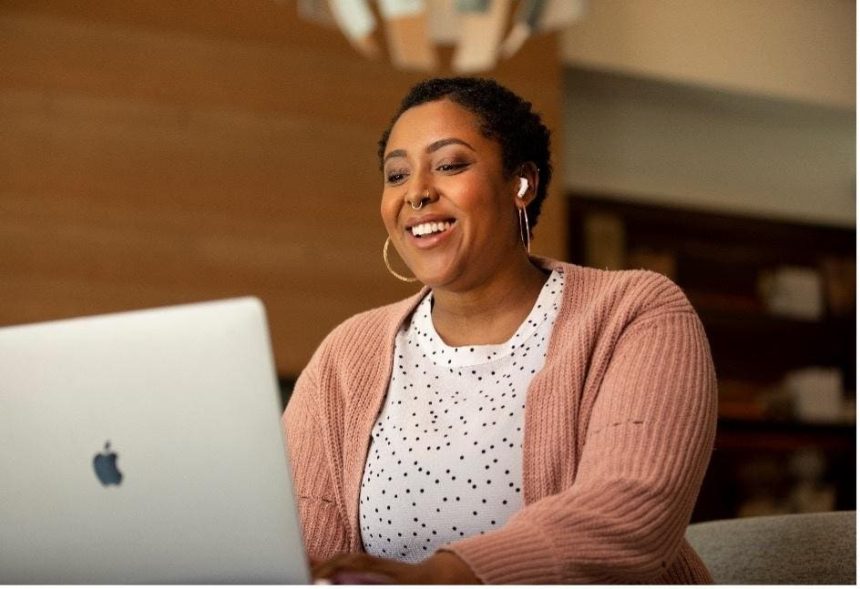Unlocking access to education at every stage in life.
By design, universities have largely supported an exclusive and rigid path: finish high school, get into college, graduate, and then join the workforce. But the world is changing fast, and so should our approach to education. It’s time to shift from a linear, exclusive journey to a flexible and accessible one – where learners can continually enhance their skills and knowledge, no matter where they are in life.
Over two-thirds of learners already work while going to college, and the skills they need to thrive are evolving. A one-and-done education approach doesn’t match our reality. The World Economic Forum forecasts that half of all employees will need to upskill or reskill by 2025. Adding fuel to the fire, fast-growing industries like microelectronics are sparking hundreds of thousands of new jobs that necessitate a diversity of professional and technical skills. And, the cross-sector integration of emerging technologies, like artificial intelligence, calls for rapid creation of responsive learning content and pathways.
The good news is that postsecondary education institutions are already positioned to help upskill learners. Unfortunately, many have not updated their business models to support the lifelong learning trajectory. At Arizona State University, our charter has guided a redesign of the modern global research university to holistically support a learners’ journey throughout their life:
We measure ourselves by “whom we include and how they succeed; advancing research and discovery of public value; and assuming fundamental responsibility for the economic, social, cultural and overall health of the communities it serves.”
As it turns out, the overall health of the communities we serve does not begin and end with college. We must support learners in every formative step of their lives.
Empowering quality at scale
Many people ask me, how do you maintain quality when you are supporting hundreds of thousands learners?
As a society, we must dispel the myth that scale somehow dilutes the experience or quality of an offering. That, somehow, the smaller and more boutique a school is, the higher the quality. In a technology enabled world, it turns out the opposite is true. Scale actually enables a higher quality offering. As more learners participate in our learner offerings, the more data is available to us to continually improve their experience. If we had a small number of learners, the improvement process would be much slower, laborious and expensive on a per learner basis.
Institutions can reach more learners over the course of their lives by tapping into their rich ecosystems of expertise and content. Education leaders can begin by asking themselves and each other: What have we created here that we can share with more learners to help achieve their goals? How can we foster more authentic engagement with our learners throughout their lives? It’s important to bring learner and employer voices to the table to address these questions in the most holistic manner possible.
When it comes to large-scale transformation across the postsecondary education system, individual institutions and employers cannot afford to live on islands, working on their own. It takes strategic partnerships between postsecondary institutions and industry – as well as government and funding organizations – to create effective lifelong learning pathways for learners that allow them to quickly adapt to meet the demands of our changing workforce and unlock their potential.
Blending professional and technical skills for life
Part of large-scale transformation is recognizing that skills don’t exist in a vacuum. Even the most technical industries, like microelectronics, require talented engineers who bring the mindset and aptitude to collaborate, communicate and problem-solve. A technician will both need to know how to manufacture semiconductor packaging and troubleshoot creatively with their team when they encounter an issue.
Of course, listening to and partnering with employers to understand the next greatest needs is key to helping people find successful and fulfilling careers. Through ASU CareerCatalyst, we partner with industry titans like Starbucks and Uber to upskill their workforce at massive scale – allowing them to access and help design the more than 300 courses and certificates in our library. Some of the most popular courses today include ASU’s Google-partnered Sustainability and generative AI certificates.
Institutions that are truly designed to serve learners must forge a clear path for those wanting to earn a degree, and won’t deny anyone the opportunity to grow. Programs like ASU’s Earned Admission helps aspiring students that don’t meet admission criteria take college-level courses and earn their spot at ASU, or transfer their credits to another institution.
Rising to the opportunity: Arizona State University
To address changing societal and economic challenges head on, we must meet learners where they are. That’s why ASU launched the Learning Enterprise (LE) in 2021 – to advance universal access to learning at all life stages.
By leveraging the best of ASU’s knowledge as a world-class research university, LE serves as one of the three core pillars of ASU and is the umbrella of scalable learning programs that are within reach for all learners, everywhere.
We’re unapologetically relentless about universal access. Offering a diversity of flexible pathways to postsecondary education is enabling us to reach more learners and professionals. In just three years, we’ve grown to serve 350,000 learners, staying in tune with the most in-demand skills they need to achieve their goals.
Want to learn more? Interested in partnering with us? Get in touch at [email protected].
Read the full article here










